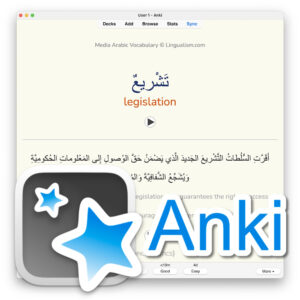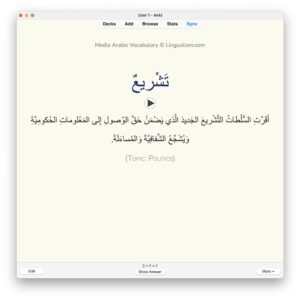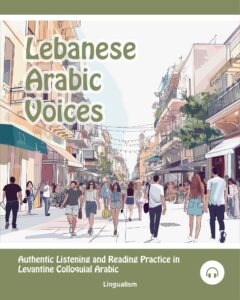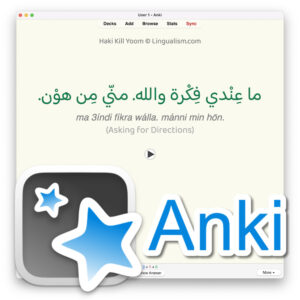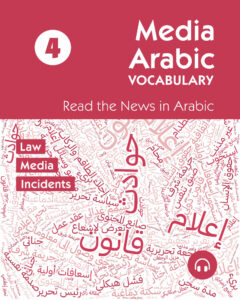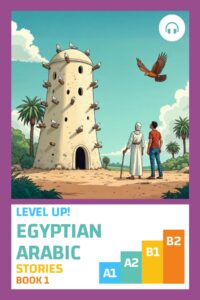Table of Contents
Reading the news in Arabic can be a daunting task for learners, especially those at the intermediate level. The language used in media often differs significantly from the standard Arabic taught in classrooms, presenting a unique set of challenges. However, with the right approach and resources, you can overcome these challenges and significantly enhance your Arabic language skills. In this blog post, we will discuss some of these challenges, offer tips on how to tackle real-world media Arabic, and introduce you to a valuable resource: the “Media Arabic Vocabulary” series.
Challenges of Reading News in Arabic
1. Vocabulary: One of the primary challenges learners face when reading news in Arabic is the specialized vocabulary. News articles, whether they’re about politics, economics, or culture, often use a set of terminologies that may not be covered in traditional Arabic language courses. This can make comprehension difficult, especially for intermediate learners who are still expanding their vocabulary. However, with consistent exposure and the use of helpful resources like Lingualism’s Media Arabic Vocabulary series, learners can gradually familiarize themselves with these terms and improve their understanding of news articles.
2. No tashkeel: Another significant challenge that learners often encounter when reading Arabic news is the absence of diacritics in the text. Diacritics, or tashkeel, are a set of marks used in Arabic script to indicate vowels, nunation, and other phonetic features. In most Arabic texts, especially in news articles, these diacritical marks are usually omitted. This can make it difficult for learners to correctly identify word forms and pronunciations, particularly for words that they are encountering for the first time. This challenge can be particularly daunting for intermediate learners who are still building their vocabulary and grammatical knowledge. Again, resources like the Media Arabic Vocabulary series can be incredibly helpful in this regard. The series includes diacritics in all Arabic content, aiding learners in word recognition and correct pronunciation. This feature can significantly enhance learners’ reading comprehension and pronunciation skills, making the series a valuable tool for those aiming to improve their media Arabic literacy.
2. Dialects: Another significant challenge is the presence of various dialects in Arabic. While Modern Standard Arabic (MSA) is used in formal contexts like news reporting, regional dialects can influence the language used, especially in interviews or local news stories. This can be confusing for learners who have primarily studied MSA. However, understanding these dialectal differences is a crucial part of achieving fluency in Arabic, and engaging with media content can provide valuable exposure to these variations. (Lingualism specializes in materials for learning Arabic dialects.)
4. Cultural References: Lastly, cultural references in news stories can pose a challenge. News stories often contain references to local culture, politics, history, and religion, which can be confusing for learners unfamiliar with these contexts. However, understanding these references can significantly enhance your cultural literacy and deepen your understanding of Arabic-speaking societies.
Tips for Reading News in Arabic
1. Start Small: When starting to read news in Arabic, it’s advisable to start small. Begin with shorter articles or news summaries. As your confidence grows, you can gradually move on to longer, more complex pieces. This approach allows you to build your comprehension skills gradually, reducing the risk of feeling overwhelmed.
2. Use a Dictionary: Having a good Arabic-English dictionary at your disposal is another crucial tip. As you encounter new words and phrases, a dictionary can help you understand their meanings and usage. Over time, this will expand your vocabulary and improve your ability to understand news articles without needing to look up words.
3. Engage with Different Media: Diversifying your learning resources is also beneficial. Don’t limit yourself to written news. Watching news broadcasts can help improve your listening skills and pronunciation. It also provides exposure to different dialects and accents, enhancing your understanding of the language’s diversity.
4. Practice Regularly: Lastly, like any language skill, regular practice is key. Try to incorporate reading Arabic news into your daily routine. This consistent exposure will help reinforce your vocabulary and comprehension skills, accelerating your progress towards fluency.
Media Arabic Vocabulary Series
The Media Arabic Vocabulary series is a powerful tool that can significantly enhance your Arabic language skills, particularly in the context of media literacy. This innovative series is designed to help you navigate the complexities of real-world Arabic media, providing a dynamic approach to learning Arabic that goes beyond traditional classroom instruction.
One of the standout features of this series is its thematic structure. Each volume focuses on a handful of different themes, allowing you to choose topics that align with your interests. This approach not only makes learning more engaging but also provides context for the vocabulary, aiding in comprehension and retention.
The series also employs a self-discovery approach to learning. Instead of traditional exercises, you are encouraged to actively engage with the material, fostering a deeper understanding of the language. This interactive learning style, combined with the series’ flexible structure, allows you to chart your own learning path. You can choose to work through the materials in order, or you can jump around to different sections and books based on your learning goals.
To further support your learning, the series includes several helpful features. Diacritics are used throughout the Arabic content to aid in word recognition and correct pronunciation. English translations are provided for all Arabic content, enhancing comprehension. Additionally, the series comes with over seven hours of audio content to help improve your pronunciation and listening comprehension.
In using the Media Arabic Vocabulary series, we recommend that you take full advantage of these features. Listen to the audio tracks regularly to familiarize yourself with the sounds and rhythms of the language. Use the English translations to check your understanding but try to rely on them less as your skills improve. Engage actively with the material, making notes, and practicing the vocabulary in different contexts.
Remember, the Media Arabic Vocabulary series is not a magic solution but a tool. Your progress will depend on the effort you put into your learning. Use the series consistently, practice regularly, and most importantly, enjoy the process of learning. With time and dedication, you’ll find your Arabic skills, particularly in understanding and discussing media, improving significantly.
Do you have any questions or need further information? Feel free to ask in the comments section below.
-
Sale!
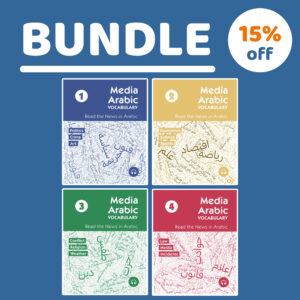
Media Arabic Vocabulary: eBook Bundle
$107.96Original price was: $107.96.$91.76Current price is: $91.76. -
Sale!
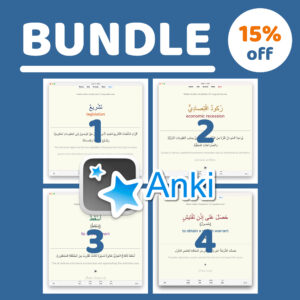
Media Arabic Vocabulary: Anki Bundle
$79.96Original price was: $79.96.$67.96Current price is: $67.96. -
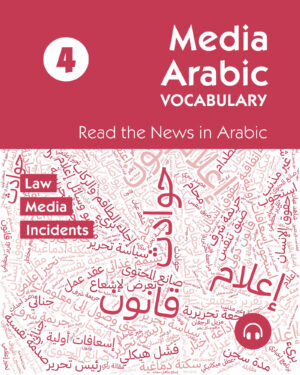
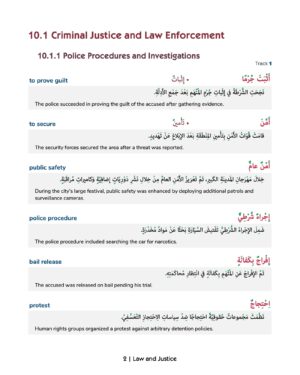
-
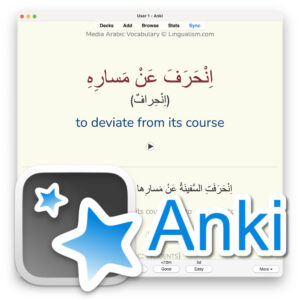
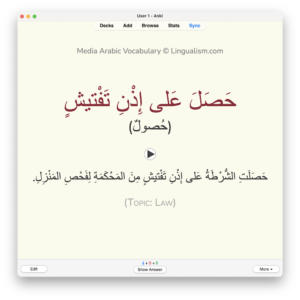
-
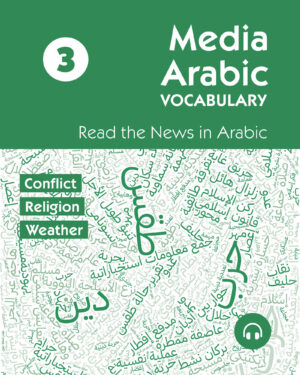
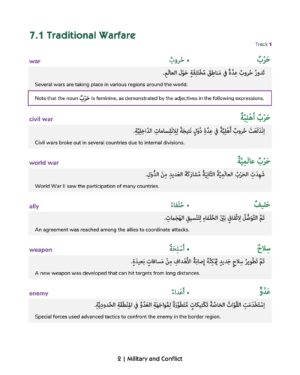
-
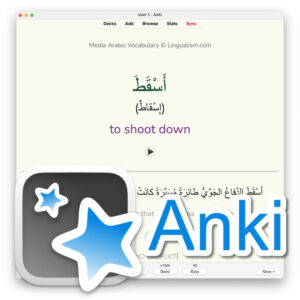
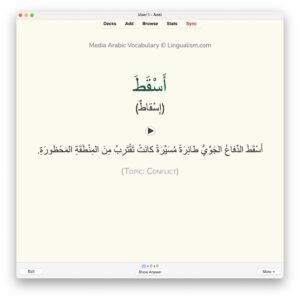
-
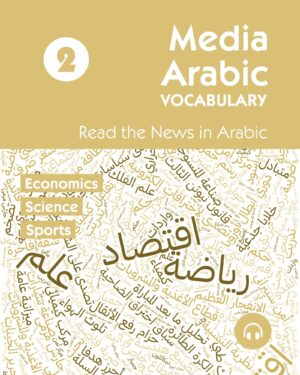
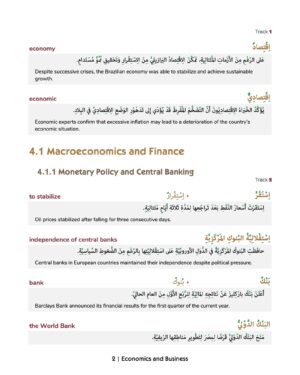
-
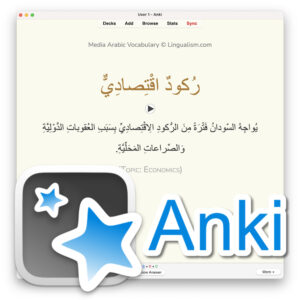
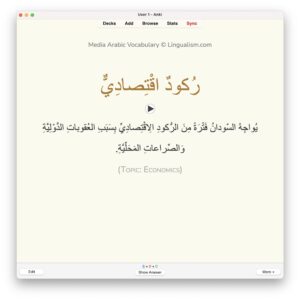
-
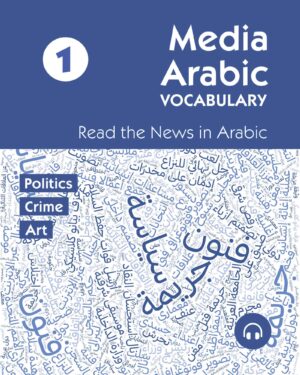
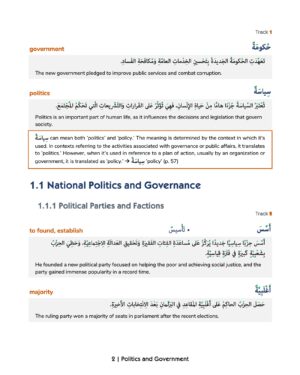
-
